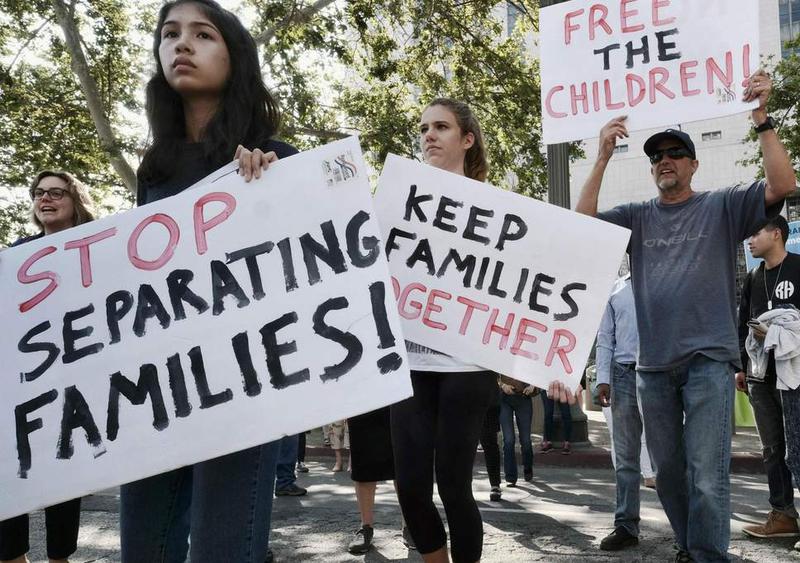POSTING DATE: July 2, 2018
Learn More About:
Immigration News & Updates eNewsletter © 2011 - 2018
For questions about U.S. Residency, Green Cards and Immigration Visas, Visit our Website at: www.ImmigrateToday.com or call our office at: (954) 382-5378
Check Out This Cool Stuff For Immigrants....
Immigration
Questions & Answers
This Week's Immigration News
Question: I’m american and I have a girlfriend from Trinidad. We met in school and have been dating for the past 2 years. We decided to get married recently and she went home to visit her parents and break the news and to bring back her birth certificate and some other things. She was coming through Miami airport last week and the officer asked her why she was coming back to the U.S. since she had already graduated college and she said she was coming back here to visit me. At that point, they took her to a room and searched her luggage and found her birth certificate and went through her phone and saw text messages we sent to each other which mentioned our engagement and planned wedding. The officer told her he was denying her entry, cancelled her US visa and said she had to go back home and wait for me to sponsor her. I was waiting outside for her at the airport and didn’t know what happened until she called me crying and told me what happened. She had to take the next flight home. We are both in shock and devastated. Now she has no visa to come back and we don’t know what to do. A friend told me to contact you. We want to know how fast you can get her back here to get married or do I have to go there are get married and can I bring her back here with me after that? Thanks.
Answer: Sorry to hear about what your fiancée just experienced, I know it can be very shocking when something like this happens. Unfortunately, there is no way to bring her back here to the U.S. any time soon. The quickest route to get you both back together at this point is for you to go to Trinidad and get married, and then we will file the spousal immigration petition for her. The process will take about 12 months for her to be able to immigrate to the U.S. through the U.S. Consulate abroad as your spouse. The fiancée visa used to be a quicker option, but at this point in time, it takes about the same time as the spousal route. Once she arrives here, she will receive her Green Card within several months. We can meet before you travel to Trinidad so I can give you the document list and information I will need for you to gather in order for us to prepare your case. See you soon.
Federal Judge Orders Trump Administration To Reunite
Separated Families Within 30 Days
Helpful Immigration Tips You Can Use...
Immigration News & Updates eNewsletter
eNewsletter
Last week a federal judge issued an Order forcing the Trump administration to reunite migrant parents with children taken from them as part of the government’s family separation policy. Under the Order, some 2,300 children will rejoin their parents and family members. Children age 4 or younger must be returned to their parents within 14 days and older children within 30 days.
The judge sharply criticized the Trump administration for creating “a chaotic circumstance of the Government’s own making,” and that the government’s lack of planning before embarking on the policy was a “startling reality”. “The government readily keeps track of personal property of detainees in criminal and immigration proceedings,” , “Money, important documents, and automobiles, to name a few, are routinely catalogued,
Immigration How To:
How Do I Know When I Should File To Renew My Work Permit?
USCIS Provides Resources For Free U.S. Citizenship Preparation Classes Throughout the U.S.
Many immigrants who apply for naturalization don’t feel comfortable taking tests online and instead prefer to get some personal guidance and assistance while studying for the exam. Immigrants who speak English may still desire to study for the test in their own language, even though they will later take the test in English and others simply want to be part of a class to get reassurance that they are correctly studying and progressing towards their test goals.
The good news is that there are free Citizenship study classes throughout American and many in each city.
File For Work Permit Renewal 180 days Prior To Expiration
Under current policies, most work permits based upon residency are automatically extended for 180 days past expiration, as long as a renewal application is pending. However, even though work authorization is technically extended, the permit itself shows expired and many employers do not accept the 180 extension without proof. The USCIS website clearly notes the automatic extension, but there is no law or code which can be provided to employers and others requiring valid work authorization in some circumstances. As a result, since work permit processing can now take 180 days or more, it’s best to apply for renewal (form I-765) as soon as possible after the 180 day mark.
Immigration laws don’t always seem fair and in some cases, even downright heartless! This can be particularly true when a U.S. Resident parent sponsors his or her minor children under age 21. Resident parents often believe that as long as they file for their children before they reach age 21, the children will remain eligible to immigrate to the U.S. in the minor child immigration category, which has a current waiting time of about 2 years.
However, this common misconception often causes families to make sponsorship decisions which can have tragic consequences and lead to many years of family separation. In some cases Resident parents want their children to finish up school in the home country and plan to sponsor them after graduation, in others parents delay sponsorship of minor children due to financial constraints, unaware how risky these choices may be.
Common Misconception About Sponsoring Minor Children Often Leads To Heartbreak For Residents
Question: Can i file for my 2 daughters citizenship with mine although one is age 20 attends university and is solely dependent on my us citizen husband the other is a minor. We got married before she was 18.
Answer: In order for a child to qualify for automatic citizenship through a biological parent, the child must be a Resident, residing with that parent and UNDER age 18 at the time the parent is sworn in (not at the time of filing the naturalization application). The only time the issue of a stepparent comes into play, is for the purposes of the stepparent sponsoring the child for U.S. residency. In such a case, the U.S. citizen qualifies as a stepparent, if he or she married the child’s biological parent before the child was age 18. So in your case, since the daughter you referred to is 20 years old, she would not receive automatic citizenship once you are sworn in. If your other daughter is a resident, resides with you and is under age 18, as long as you swear in before she turns age 18, she would receive automatic citizenship. I hope this is helpful to you.
In your case, you cannot file for your Naturalization now, you must file to remove the conditions on your 2 year residency. Once the I-751 application is approved and you have your permanent residency, since your husband has been a U.S. Citizen for at least 3 years and you and your husband are living together as a real married couple, you can apply for Early Naturalization in June of 2019.
stored, tracked and produced upon a detainee’s release, at all levels — state and federal, citizen and alien. Yet, the government has no system in place to keep track of, provide effective communication with, and promptly produce alien children. The unfortunate reality is that under the present system migrant children are not accounted for with the same efficiency and accuracy as property. Certainly, that cannot satisfy the requirements of due process.”
The judge’s decision further blocks officials from deporting parents who have been separated from their children and prohibits future family separations, with limited exceptions. The Justice Department has not indicated whether it will appeal the decision. Stay Tuned..
Read More:
Immigration regulations pertaining to the minor children of U.S. Citizens and U.S. Residents are quite different. When a U.S. Citizen parent sponsors a minor child, that child’s age becomes “fixed” on the date the USCIS receives the family petition. This means that even if the petition is received by the USCIS a day before the child turns age 21, the child will retain “minor” status no matter how old they are when they actually immigrate to the U.S.. However, the opposite is true for minor children of U.S. Residents. When a U.S. Resident parent files a family petition for his or her minor child, that child continues to age and if the child reaches age 21 before eligibility to immigrate, he or she automatically moves from the F2A immigration category for minor children of U.S. Residents (approx 2 year wait time) to F2B category with an approx wait time of 7 years. The Child Status Protection Act (CSPA) does allow the time the I-130 petition was pending with the USCIS before approval to be subtracted from the age of the child at the time a visa becomes available, but in many cases, that is still not enough to bring the child’s age back down below 21.
It’s important to know that when a Resident parent naturalizes, the age of any child sponsored by a pending or approved I-130 becomes fixed on that date. This can be a blessing in some cases when the child is under age 21, but a nightmare in others when a child has already reached age 21 and the CSPA would have allowed the subtraction of time from the child’s age, if the parent had remained a Resident. Resident parents are often unaware of the ramifications of waiting to sponsor their minor children until they are informed by the National Visa Center or consular official that their child is no longer eligible to immigrate as a minor. At that point, the damage is done and there is no choice but to accept the reality that their child will not be able to join them in the U.S. for many years to come. Parents would do anything to rectify the situation at that point, but unfortunately, it s too late. The solution to avoiding such consequences is to carefully preplan the entire family immigration process, beforehand, taking into account excessive backlogs, processing and waiting times. Never rely on sketchy advice from well meaning friends or family about what the law is. Instead, schedule a consultation with a qualified Immigration Attorney to find out what the best approach is for your particular family circumstances.
In a recent announcement, the Immigration and Customs Enforcement (ICE) reported that the agency had more than doubled worksite enforcement raids in less than a year. From Oct. 1, 2017, through May 4, 2018, the agency conducted 3,510 worksite investigations and made some 594 criminal and 610 administrative worksite-related arrests. In comparison, during the previous year, ICE reported only 1,716 worksite investigations, with 139 criminal and 172 administrative worksite arrests. Such ICE raids target employers who employ unauthorized workers, prosecute and impose fines on company owners and arrest immigrants found to be working illegally.
ICE Raids Have More Than Doubled Over The Past Year!
. Experts anticipate an even higher increase in the coming years, as the Trump administration continues to ramp up its “zero tolerance” policy.
Read more about increased ICE raids:












